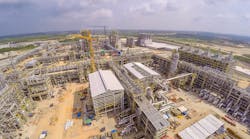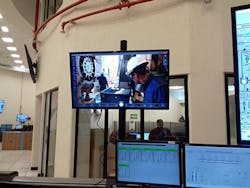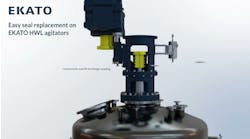Intelligent Wearables Transform Operational Performance
Braskem Idesa’s Nanchital plant in Veracruz, Mexico, is the company’s flagship manufacturing site. It is one of the largest integrated polyethylene (PE) facilities in the Americas, producing 1.05 million tons of ethylene and PE per year from ethane. The plant was built to reduce the gap between Mexico’s local PE production and demand and to satisfy increasing requirements of the plastic processing industry.
A joint venture between Brazilian petrochemical company Braskem and Mexico-based Grupo Idesa, the firm was formed in 2010 and began production in March 2016.
To strengthen its competitiveness and position the company for Industry 4.0, parent company Braskem drew up plans for the digital transformation of its global businesses. The initiative mainly focused on three areas: production, logistics and administration. It resulted in identifying a number of operational improvements at the Nanchital plant that digital technologies likely could deliver.
Closing A Glaring Gap
One key area of concern was the widening disparity between the technology found in the control room and that used by workers around the plant. While Braskem Idesa’s control room operations had evolved steadily in line with the latest advances in process automation, its field staff continued to manually perform many tasks such as taking equipment readings, solving operational problems and conducting field training. Use of laptops, tablets, mobile phones and other portable technologies around the plant was sporadic.
Field training was a particular concern because the new generation of workers Braskem Idesa was trying to attract were conditioned to learning with the support of technology aids. Training new operators at a pace faster than normal for the petrochemical industry was a major challenge for Braskem Idesa, and innovative technology would certainly help to achieve this goal. In addition, knowledge transfer from experienced operators to the new ones was also a concern.
The technology gap also was noticeable when field staff conducted inspections around the plant to identify situations that might require maintenance or reliability attention, detected through observation or field readings. Whenever such a situation was spotted, field operators used traditional radio communication to alert control room supervisors. However, the people in the field lacked cameras or video equipment to help capture and convey the finer detail or urgency of the issue. Without the full picture, the control room couldn’t always authorize the fastest, most effective response.
Figure 1. Lightweight unit features an intelligent built-in visual display and can capture and stream videos.
To bridge the divide, Braskem Idesa decided to equip its field workers with the latest digital technology. By empowering workers to increase safety, reliability and productivity at Nanchital, the company believed the monitoring and control of the site’s production process would significantly improve — leading to safer operations, enhanced profitability and business success.
The initiative was christened Cyclops, after the mythological creature with one eye. In many cultures, a single eye symbolizes intelligence, wisdom and enlightenment — one who is “all-seeing.” Braskem Idesa started activities related to the initiative in November 2018.
To turn its Cyclops vision into reality, Braskem Idesa conducted a thorough search for a technology partner and selected Honeywell, a pioneer and market leader in intelligent wearable devices. Honeywell not only shared the company’s vision but also offered proven technology and a competitive cost/benefit ratio. Honeywell subsequently proposed an outcome-based solution comprised of hardware, software and services, plus supporting plantwide WiFi infrastructure.
Intelligent Wearables Play Key Role
The centerpiece of the Cyclops initiative is — appropriately — an intelligent, digital visual display built into a lightweight hard hat (Figure 1); it is designed to improve productivity, collaboration and compliance with process procedures, capture the expertise of experienced workers and provide critical insights and information to field-based trainees and support staff. By incorporating Honeywell’s Intelligent Wearables program, a combination of hardware, software and services, Braskem Idesa benefits from technology that responds to voice commands and software that brings live data, documents, work procedures and health and safety information into view. It also captures and streams live video and pictures back to the control room, facilitating a fast, effective response to unfolding incidents.
Honeywell supplied its intelligent wearable devices for plantwide use with a range of software applications to help field workers improve speed, safety and reliability.
For example, workers needing support or advice can call via their voice-controlled headsets an expert in the central control room or elsewhere who can then provide input in real time. Honeywell calls this application Expert on Call. Recently, this helped avert a potential incident that could have put lives at risk. A field operator spotted a developing gas leak and contacted Expert on Call for help. The instant availability of knowledgeable resources and specific guidance on how to stop the leak reassured the operator, enabling him to calmly carry out the necessary procedure.
In addition, embedded video support eases troubleshooting; field workers can view videos that demonstrate key tasks wherever they may be in the plant. Video also allows field operators to share unfolding incidents with control room supervisors and make instant collective decisions on how to contain them. In the past, supervisors typically had to see reported issues for themselves — sometimes leading to a 20-min. delay before any action was taken.
Meanwhile, common and complex tasks such as inspection rounds have become easier thanks to voice-controlled software that provides step-by-step instructions and eliminates the need to carry clipboards, pens and flashlights.
Figure 2. Intelligent wearables enable visually following activities to change the status of equipment.
Moreover, the intelligent wearables are helping field workers to expedite routine tasks such as monitoring equipment startup and shutdown (Figure 2), inspecting and verifying raw material shipments, collecting evidence of unsafe processes and conditions around the plant, and streamlining the delivery of equipment for maintenance.
On a strategic level, the solution is helping Braskem Idesa capture and share expertise and data throughout the organization and provide Nanchital’s 200 field operators with relevant information and insights wherever and whenever required. Connecting field workers with remote advice also reduces the need for site visits from experts and empowers workers to continue learning, share knowledge with peers and perform to Braskem Idesa’s best standards.
Nanchital’s field workers resoundingly have embraced Honeywell Intelligent Wearables. More-experienced engineers cite the radical increase in education and knowledge transfer. In addition, the innovative design naturally appeals to newer engineers. Indeed, Braskem Idesa feels that intelligent wearables provide a strong incentive for next-generation talent to join the company.
Moreover, their use underscores its strategic ambition to lead the implementation of Industry 4.0 in Latin America.
Success Spurs More Moves
Based on the implementation’s success, Braskem Idesa is planning additional deployments of Honeywell technology at Nanchital to tackle business challenges such as meeting tightening environmental and safety standards, improving compliance while achieving cost savings, reducing waste and increasing plant efficiency.
One of the next implementations will focus on optimizing inspection rounds. Nanchital will use software that’s part of Honeywell’s Forge suite to digitalize workflows, to enable increased compliance during field operator rounds, reduced manual effort and enhanced collaboration and decision-making between the field and control room.
Additionally, given the enthusiasm for intelligent wearables evident at Nanchital and their impact on performance there, parent company Braskem is closely following the results of the Cyclops program with the intention of implementing it in selected sites around the world.
For both Braskem and Braskem Idesa, Cyclops marks a milestone along a carefully orchestrated Industry 4.0 journey. Significantly, it puts a company’s most valuable assets — its skilled plant workers — first.
ROBERTO VELASCO GUTIÉRREZ is Coatzacoalcos, Mexico-based industrial director of Braskem Idesa. VERONICA TURNER is business development leader at Honeywell, Houston. Email them at [email protected] and [email protected]




